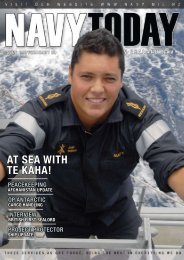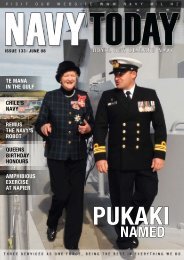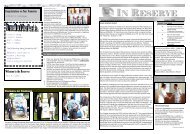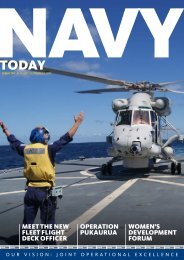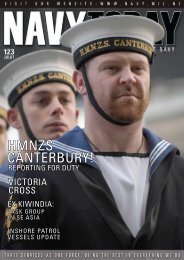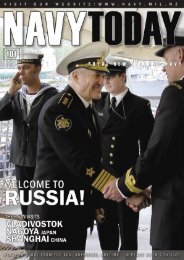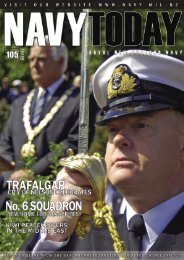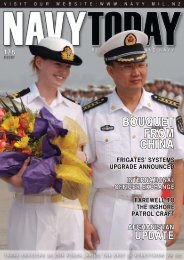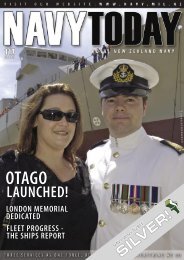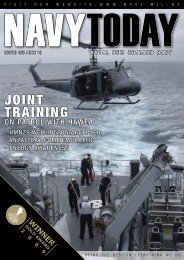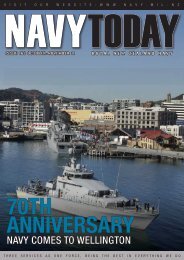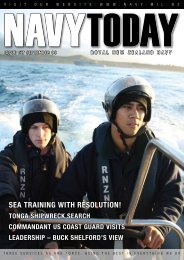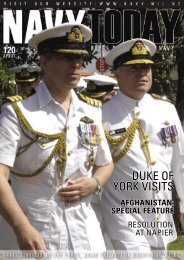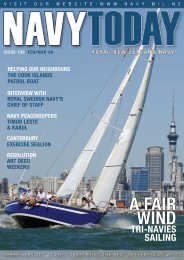May 2012, Issue 166 - Royal New Zealand Navy
May 2012, Issue 166 - Royal New Zealand Navy
May 2012, Issue 166 - Royal New Zealand Navy
You also want an ePaper? Increase the reach of your titles
YUMPU automatically turns print PDFs into web optimized ePapers that Google loves.
won report<br />
WON Report<br />
By DEAN BLOOR<br />
Warrant Officer of the <strong>Navy</strong><br />
One question that I get asked on a regular<br />
basis when I am out and about is “What<br />
is morale like in the <strong>Navy</strong>?” I suspect that,<br />
more often than not, the person raising the<br />
question already has a set view and is just<br />
trying to illicit confirmation of that view.<br />
Personally, I don’t think the answer is as<br />
simple as giving it a good or bad response.<br />
NZDF events play a large part in employee morale.<br />
The Civilianisation programme implemented last<br />
year would support this theory.<br />
Another driver that affects morale is how our<br />
personnel are led in the workplace. This area of<br />
leadership is the responsibility of all who have<br />
been entrusted with the responsibilities of rank.<br />
From my own experience and from what I see<br />
around the traps, morale can vary depending on<br />
where you are posted and the quality of personnel<br />
leading in those areas.<br />
If there are proactive leaders who get to know<br />
and take an interest in their personnel it goes<br />
some way towards creating a positive work<br />
environment. No surprises that people enjoy<br />
going to work.<br />
I also see poor morale in the workplace when<br />
personnel who I refer to as “doom and gloomers”<br />
automatically default to the negative at every<br />
opportunity. Sadly these personnel do not realise<br />
that their poor attitude is contributing to the poor<br />
morale around them.<br />
I attended the latest “Kia Kaha” programme run in<br />
conjunction with North Shore Police in February.<br />
The programme focuses on personnel making<br />
the right decisions in their life and some of the<br />
potential outcomes when bad decisions are taken.<br />
The guest speaker that night was former All Black<br />
Captain and sailor Buck Shelford.<br />
During Buck’s address he asked the Basic<br />
Common Trainees (BCTs) and Junior Officer<br />
Common Trainees (JOCTs) “Who wanted to make<br />
the <strong>Navy</strong> a career?”. All but one put their hand up<br />
to indicate they did.<br />
I took from this response that, if they want a<br />
career after five weeks in the <strong>Navy</strong>, we need to<br />
ensure they want to remain in the <strong>Navy</strong> for years<br />
to come. A couple of ways of doing this is to<br />
provide positive work environments and career<br />
opportunities.<br />
A good way of building positive work<br />
environments is through sport and recreational<br />
activities. I am starting to see some real proactive<br />
leadership in this area. One of many examples is<br />
what is happening on the good ship TE MANA.<br />
TEM is currently in an extended maintenance<br />
period. However, their leadership are proactively<br />
organising team building activities for the ship’s<br />
company to participate in. These activities offer<br />
a very good avenue to break from the workplace<br />
and recharge the batteries.<br />
LTCDR Roger Saynor (Fleet sports officer) and<br />
his team are also proactively organising sport<br />
and recreation activities at Devonport Naval<br />
Base for our personnel. The focus is encouraging<br />
personnel to get out of their work areas to take a<br />
well-earned break.<br />
Like most things, there is never going to be<br />
one silver bullet for addressing an issue. More<br />
often than not, many things will contribute to<br />
making things better for our people. We can all<br />
positively influence morale in the <strong>Navy</strong>. Before<br />
defaulting to the automatic finger-point it would<br />
be more productive to think what I can do to<br />
make things better.<br />
It is very easy to lead when the sun is shining.<br />
However, good leaders shine when times are a<br />
little more difficult.<br />
The latest BCT and JOCT trainees are still<br />
looking for all the things the older folk yearned<br />
for when they joined. Let’s give them every<br />
opportunity to realise their dreams. The <strong>Royal</strong><br />
<strong>New</strong> <strong>Zealand</strong> <strong>Navy</strong> is still a great place to work<br />
in with some great people working in it.<br />
DSS volunteer firefighter to<br />
climb Skytower for cancer<br />
Dave Wills, a civilian at Defence Shared<br />
Services in Trentham, is a volunteer<br />
firefighter in his spare time and this<br />
year he is competing in the Sky City<br />
Firefighter Sky Tower Stair Challenge<br />
for the second time, raising money for<br />
leukaemia sufferers in <strong>New</strong> <strong>Zealand</strong>.<br />
The Challenge, on 19 <strong>May</strong>, is a race up<br />
all 51 floors of Auckland’s Sky Tower<br />
(1,103 steps!) in full firefighting uniform<br />
with breathing apparatus on. That means<br />
breathing through the mask the entire<br />
climb. All the extra equipment weighs in at<br />
25kgs. Dave has been training hard since<br />
February and his goal is to complete the<br />
Challenge in less than 15 minutes.<br />
Dave is dedicating his climb this year<br />
to All Black Jock Hobbs, who died of<br />
leukaemia in March, and NZ Army WO1<br />
Mark Priestley who has battled leukaemia<br />
for the past 10 years. Last year, Mark’s<br />
condition took a turn for the worse and<br />
he was told he only had weeks to live. He<br />
was offered a new type of chemotherapy,<br />
at a cost of $64,000, money he had to find<br />
himself. After weeks of being in quarantine<br />
following the chemo, Mark underwent<br />
a bone marrow transplant, a very risky<br />
procedure. Mark is now doing well and<br />
working from home until his immune<br />
system recovers.<br />
Money raised from the Firefighter Sky<br />
Tower Stair Challenge will ultimately<br />
help Leukaemia and Blood Cancer <strong>New</strong><br />
<strong>Zealand</strong> (LBC) support patients like Mark<br />
and their families living with leukaemia,<br />
lymphoma, myeloma or other blood<br />
cancers and diseases.<br />
Dave’s goal is to raise $5000 for LBC.<br />
Recently he went around the Trentham<br />
Defence Area units (in full uniform complete<br />
with breathing apparatus) collecting<br />
donations and raised an impressive<br />
$1433. Combined with $500 from a<br />
raffle and close to $3000 on his online<br />
fundraising page, Dave is well on the way<br />
to exceeding his target.<br />
If you wish to support Dave in this worthy<br />
cause, take a look at his fundraising page.<br />
The link is: www.firefightersclimb.org.nz/<br />
view_event_profile/651<br />
WWW.NAVY.MIL.NZ NT<strong>166</strong>april-may12 21



